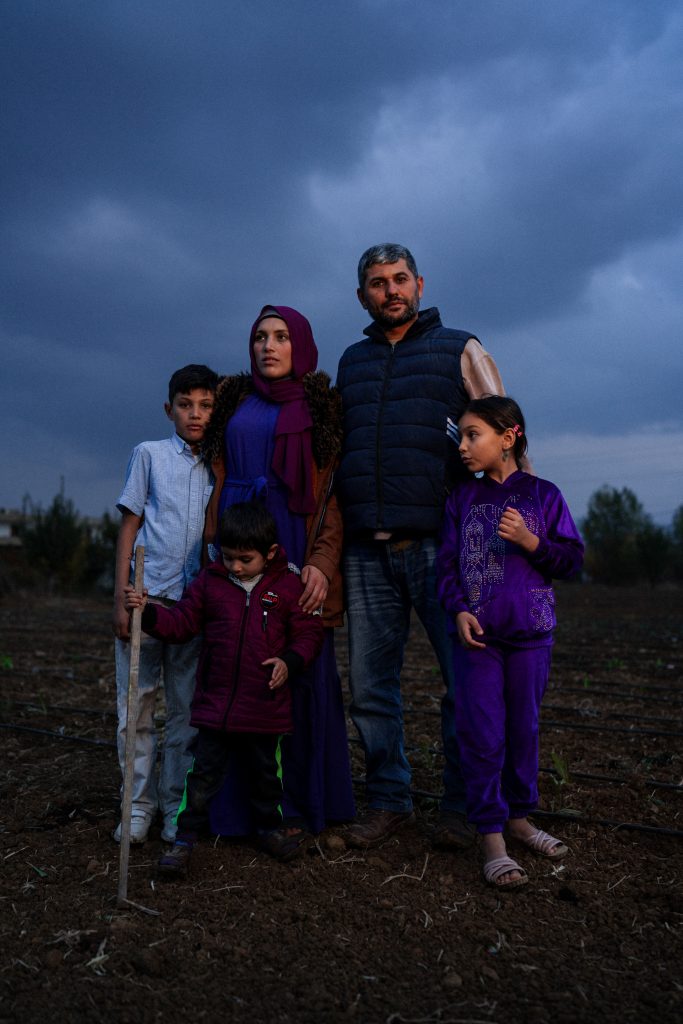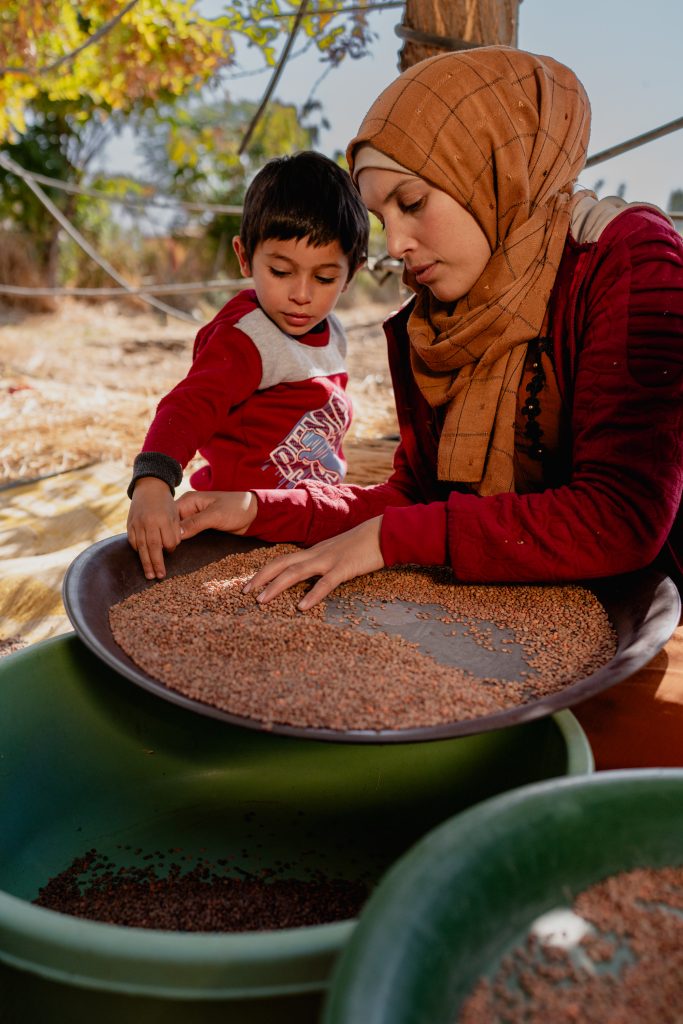 Posted in
Life & Culture, Dazed MENA issue 00
Posted in
Life & Culture, Dazed MENA issue 00
For a Syrian family in Lebanon, seeds are the one constant
Text Nur Turkmani | Photography Gabriel Ferneini
It is autumn, and Walid is in Saadnayel, where he prepares the soil for winter cultivation, cares for the sheep, soaks and splits seeds, and puts his children to sleep.
At 2 hectares, the plot of land Walid lives and works on—along with twenty other farmers, engineers, educators, cooks, caregivers, and children from Lebanon, Syria, France, and Madagascar—is small but mighty.
Young trees sprawl. Goats graze, wildflowers and aromatics multiply, bees buzz, and nearly a hundred crop varieties grow. The farm is also a school that offers lessons in beekeeping, seed cultivation, and composting. It carries a seed library with over 250 heirloom types and hosts a large yellow circus tent where children from nearby neighbourhoods come to play.

























Originally published in Dazed MENA issue 00 | Order here
This plot, this farm, this school, this playground is Buzuruna Juzuruna (Our Seeds are our Roots)–a horizontal, grassroots initiative that began in 2015. Today, after nearly a decade of work, it stands in Saadnayel, in the Bekaa Valley, as an organic, agroecological seed farm committed to sustainable farming and the preservation of heritage seeds.
“The land is our mother–we are from the soil, and to it we return,” Walid tells me. His voice is light, and his sentences often begin and end with an expression of gratitude: to God, his loved ones, the seasons. “And who wants to be estranged? No one. Without land, we lose our identity and pride, we become a people without a place.”

Walid himself is from rural Aleppo, a region that has witnessed endless aerial bombardment at the hands of the Syrian regime and Russia and fierce ground battles between the government and opposition forces. Like millions of Syrians, Walid and his wife, Fidda, were forced to flee their homes. And like hundreds of thousands, they’ve settled in the Bekaa, where they raise a family of three daughters and two sons, where they tend to a land.
I ask Walid about moving to Lebanon and working here as a farmer. Of course, my question is loaded. Around us, in the Bekaa, but also across Lebanon, anti-refugee sentiment and rampant racism pervade. Historical neglect of rural areas, disjointed and adhoc government policies, crumbling nationwide infrastructure, scarce resources, and the relentless scapegoating of Lebanon’s most vulnerable by its political—all this, and more, have stoked tensions.
“Sure,” Walid says, “There is discrimination everywhere. But there’s also historic dependence on us when it comes to Lebanon’s agriculture.” He reminds me that Syrians have long worked in the Bekaa, even before the war in Syria. “So, I’m relaxed here. I love nature. As long as I am in it, I feel safe and comfortable. […]. The Bekaa has so much richness to it.”
It’s true. There’s an almost haunting wilderness to the Bekaa Valley, its sloping hills and crimson-red soil. Indebted to the seasons, the landscape changes so quickly it’s rarely possible to register it. Consider driving up its sinuous roads in the early morning of autumn, the trucks loaded with seasonal fruits and vegetables, drivers impatient and honking, and the plains already shedding their copper-gold leaves. But this flakiness is tempered by a sense of continuity: for centuries, and across two mountain ranges, the Bekaa’s wide-open stretch remains, providing our cheese and bread and figs and wine, day after day.





Syrians have long been seasonal migrants, moving from village to village, working across fields, vineyards, and orchards. Even after Lebanon and Syria became distinct political entities in the 1940s, the valley blurred the boundaries between the two countries because of the mutual interdependence between Lebanese land, Syrian labourers, and the traders and truck drivers crossing from one side to the other from sunrise to dusk.
“Lebanon is part of Bilad el-Sham,” Walid says. “But you know, there was Sykes-Picot, and suddenly you had the separation of Palestine and Lebanon and Syria and Jordan. It is the same land, though. The same atmosphere and climate.”
Actually, the exact word Walid uses is al-manakh, which I then translate into atmosphere and climate. The etymology of al-manakh remains contested though many accounts link it to Andalusian Arabic—when it was used to refer to the place where camels came to kneel or settle—before our scientific understanding of the natural world grew. After which, its meaning transitioned from the camel’s resting places to the overall climate of a region, including its weather patterns and seasonal changes.
The almanac, a calendar-booklet that includes technical information on weather and farmers’ planting dates, along with planetary information on the rising and setting of the Sun and Moon, tide tables, and dates of eclipses and religious festivals, very likely derives its name (and meaning) from al-manakh.
And what of Bilad el-Sham, a term contested perhaps not for its linguistic origins but for the histories it carries, the borders it transcends? How can we reclaim the land’s spirit—without romanticisation or nostalgia—pushing back through our work, our political imaginaries, our narratives, against the colonial lines drawn to fragment it? What does it mean to resist the logic of colonial borders, to oppose the tools of divide-and-conquer that sought to dissolve and erase what we share and that have long since spurred tentacled monsters of our own? This is why seeds matter, why they inherit such an existential weight today.

Buzuruna Juzuruna’s seed library has a striking variety of heirloom and Mediterranean seeds from Palestine, Jordan, Syria, Iraq, and Lebanon, that include aromatic black seeds and ancient varieties of wheat and rye, as well as cumin, coriander, and eggplants—reproduced and improved and shared from within the farm so that communities can grow their natural seeds. Consider how small and unassuming a seed is, but how potent its memory, the droughts and disasters and divisions it can survive.
In her poem When the World as We Knew It End, the Native American poet Joy Harjo, of the Muscogee (Creek) Nation, begins the tenth stanza with, “And then it was over, this world we had grown to love/ for its sweet grasses, for the many-coloured horses/ and fishes, for the shimmering possibilities/ while dreaming.” This apocalyptic recognition continues with, “But then there were the seeds to plant and the babies/ who needed milk and comforting […].”
For Indigenous communities—from Native Americans and Palestinians to the inhabitants of South Lebanon and the Bekaa, who’ve been kept away from their olive trees this year because of Israel’s relentless looting and bombardment—the seeds, trees, and lands are both markers and demarcators of the past, present, and future.
In a video that would go viral after October 7, Palestinian singer Dalal Abu Amneh stands on a ladder beneath a sprawling olive tree, her hands clutching onto its branches, surrounded by Palestinian women and children during a time of harvest. She begins with a mawwal– غرد يا بلبل عزيتون بلادنا – ‘Sing, oh nightingale, about the olives of my country’.
The mawwal, a prelude to many of our folk songs, originates from Bilad el-Sham. It is our throaty heirloom, hovering from town to city to village, each time adding or dropping a word, infused with local dialects. It remains a potent form for improvising our stories—to lament, to yearn, to point to something beyond what language can offer.
When Dalal sings, “In this land, we are the branches of olive trees, and we bow only to kiss the soil; the land is ours, and the country belongs to us,” the women and the children repeat after her, “the land is ours, and the country belongs to us,” and their faces break into proud little smiles, hands swaying and clapping, some fingers brushing the leaves. There is joy in the video–a togetherness that is both spontaneous and acutely aware of the land, its history, rhythm and the fruit it offers.



This is what Walid means when he says, “Our people have such an intimate relationship with the land–you plant something, then you watch it grow. It becomes a part of you, and you are a part of it. [….]. These wars being fought? They are over the land; people will always want to defend their land, to return to it, to ensure its continuity.”
But Walid, despite the war and displacement that have marked so much of his life, has deep faith in the land and his family. He tells me about Hammoudi, his eldest son and the only one of his children to have been born in Aleppo—where he lived for ten months before crossing yet another border, to Saadnayel. Often, Hammoudi follows his father and the other farmers around, learning from them how to cultivate and harvest. Other times, he deviates to play with the other children on the farm, trailing after insects and running with the goats.
Walid’s relationship with Hammoudi mirrors that with the land—a bond of care and continuity. Just as Walid and Fidda care for the soil, planting seeds and waiting to see them grow, they see Hammoudi as a continuation of their life’s work–their offspring.
In the evening after Walid and I speak, Israel strikes Saadnayel. This farm is part of a land, an ecological, social, and political fabric that Israel wants to erase.
But Buzuruna Juzuruna works against the logic of erasure. The life it preserves and creates within the farm— that of Walid, Hammoudi, the bees, the wheat plants—is a kind of ancestral memory: an intimate knowledge of the soil and its seeds, cultivated across borders and now, over generations, and calling for, or perhaps reminding of, a fundamental reorientation of our relationships to each other.
This article is indebted to Gabriel Ferneini, who has taught me much about al-manakh, smuggling seeds and ideals, and political imaginations beyond borders.
Originally published in Dazed MENA issue 00 | Order here
